|
Bristol Fashion
A jam-packed programme of events left the many delegates to CrimeFest in Bristol exhausted but happy last month. In fact almost everyone I spoke to admitted to being ‘tired and emotional’.
There were numerous panels (at least 47, if my maths is accurate) plus interviews, receptions, tutorials, book signings, a banquet and quizzes. Oh yes, there were quizzes…
My personal schedule at this year’s CrimeFest was relatively light. I had no awards to collect (again), nor speeches to make or panels to chair, though I was honoured to be a guest (for some reason) on the ‘Humour in Crime Fiction’ panel chaired by the ruthlessly intelligent Ruth Dudley Edwards.
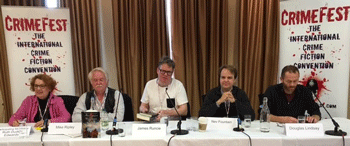
I was surrounded by witty writers (well, I think that was what the audience chanted) including not only Ruth, but James ‘Grantchester’ Runcie, comedy writer Nev Fountain and Scotsman Douglas Lindsay, who now lives in Estonia – for the climate.
It was good to see Douglas again, as he has been in Eastern Europe and the Baltic States for several years now, lecturing in jury-profiling for Eurovision as well as writing very funny books. I reminded him that somehow my invitation to the film premiere of one of his early titles must have got lost in the Hanseatic postal system and in recompense he presented me with a mint-in-box copy of the DVD version of The Legend of Barney Thomson, directed by and starring Robert Carlyle and featuring Ray Winstone, Emma Thompson and Tom Courtenay. Interestingly, the Russian version of Douglas’ Barney Thomson story is translated as Killer Haircut…
 
I remember recommending the first Barney books – The Long Midnight of Barney Thomson and The Cutting Edge of Barney Thomson – to anyone who would listen (and many who would not) when they first appeared in 1999 and 2000 as prime examples of black, Scottish humour; just the sort of books which put the ‘Bloody’ in Bloody Scotland, the annual north-of-the-border crime festival, of which more next month.
The CrimeFest gala dinner provided a unique opportunity for five of the international judges of the Ngaio Marsh Award to meet – the largest number of judges ever found in one place on the same continent: Craig Sisterson (New Zealand, Yrsa Sigurdardottir (Iceland), Pete Rozovsky (USA) with Ayo Onatade and myself representing the UK.
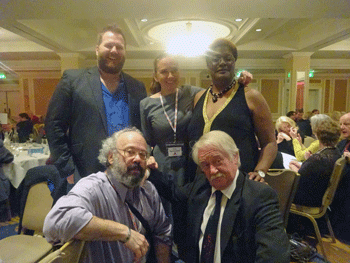
Named after New Zealand’s most famous crime writer – one of the ‘Queens’ of the ‘Golden Age’ of detective stories, the Ngaio Marsh Awards celebrate all that is good and new on the crime fiction scene on the far side of the world. The brainchild of globe-trotting Kiwi Craig Sisterson, the awards are usually presented at the Christchurch Writers Festival in October and their progress can be followed on the excellent Crime Watch http://www.kiwicrime.blogspot.co.uk website. Of the international judges assembled, three of us took the opportunity to try on our commemorative t-shirts emblazoned with the eye-catching ‘Ngaio’ logo on one side and our names and the year in which we joined the international judging panel on the reverse.
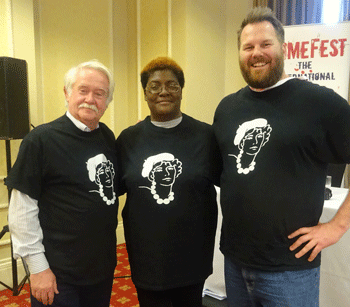
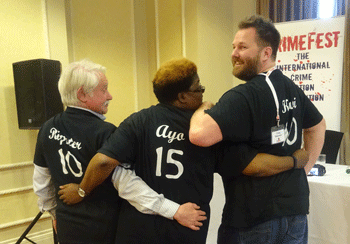
The grand finale of CrimeFest was the first performance in more than ten years (the reason for that becoming quickly clear) of the infamous panel game I’m Sorry I Haven’t A Cluedo. It proved to be an epic clash of two well-armed teams of crime-writers: Laura Wilson, Susan Moody and Alison Bruce naturally emerging victorious over Ian Rankin, Andrew Taylor and Thomas Mogford.
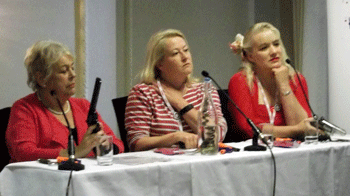
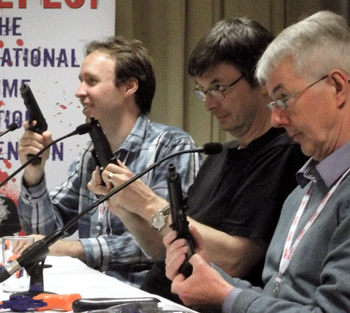
Yet the unsung stars of the show were undoubtedly the two brave ‘mystery guests’ in the legendary Feel the Crime Writer round, Ruth Dudley Edwards and Peter Guttridge.
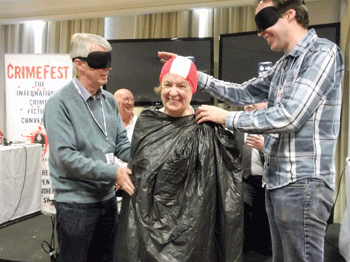
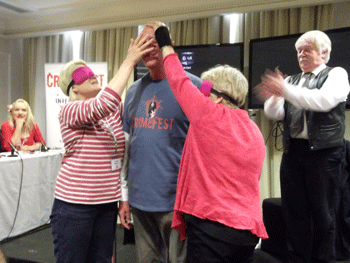
In the words of the examining Magistrates the next day, you really had to be there to believe what was going on, but for those who could not attend, were at Mass or who had sneaked off early, most of the action was caught on Prince Ali Karim’s private security cameras and can now be viewed via the links embedded in Prince Ali’s Shotsmag Confidential blogspot at http://goo.gl/IQKdRZ
In truth, my fondest and most abiding memory of Crimefest was, on the last day, the sight of a lady delegate demanding to be allowed to book not just for next year’s convention, but for the 2018 one as well. Now there, I reckon, was a happy customer.
All the Murders Fit to Print
For me, it has been a high horse frequently mounted whenever I read in a crime novel a supposed ‘extract’ from a newspaper reporting a crime. Whilst this technique is useful – sometimes vital – to the author’s plot, very few crime writers seem to realise that newspapers are restricted in what and when they can report about a specific crime. A newspaper report in a crime novel may fill in gaps for the reader or provide clues to the solution of a mystery but they rarely reflect the reality of crime reporting.

That reality, ironically, often reads like fiction, as is expertly shown by veteran journalist Duncan Campbell in his history of crime reporting in Britain since the 18th Century, We’ll All Be Murdered in Our Beds! published by Elliott & Thompson. Indeed, the true exploits of one of the first female crime reporters, Fryn Tennyson Jesse (1888-1958), who also wrote A Pin to See the Peep-Show, surely makes her a suitable candidate as the heroine/sleuthette of a series of ‘Golden Age’ detective stories. Perhaps someone has already written them.
From Charles Dickens trudging the mean streets of Victorian London to the Leveson Inquiry, Duncan Campbell has produced a cornucopia of Fleet Street lore and legend and even gives not one, but three, suspects as to which particular hack coined the immortal phrase ‘I made my excuses and left’ – and if you are young enough not to know the context in which that phrase was usually used to ‘sign off’ a story in one of the more salacious Sunday papers, then just be thankful.
Dear Albert
It has been a good month for fans of Margery Allingham, who died fifty years ago this year and whose life and work is currently commemorated in an exhibition in the Albert Sloman Library at the University of Essex, which houses the Allingham archives.
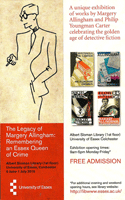
In May, Martin Edwards, Chairman of the elite Detection Club, was the guest of honour at the annual luncheon to mark Margery’s birthday, held by the Margery Allingham Society at the University Women’s Club in London’s fashionable Mayfair. It fell to Martin, as the guest speaker, to perform the ceremony of cutting Margery’s birthday with a long, sharp knife, suitably supervised by MAS chairman Barry Pike.
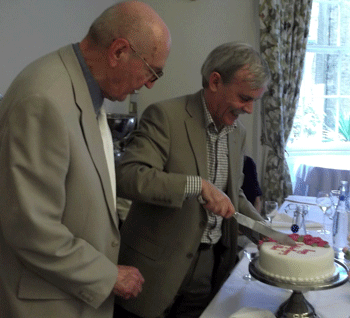
The annual general meeting of the Allingham Society, held immediately before the Birthday Lunch, heard of several new Allingham-related publications. Julia Jones, Margery’s biographer, reported on her forthcoming work Beloved Old Age which is a completion and, in a way, an expansion of Margery Allingham’s non-fiction study The Relay, which deals with the problems of living and coping with ageing family members and dementia care.
On the fiction side, there was news of new electronic versions of Margery’s backlist and new Italian editions in the famous ‘yellow’ Giallo livery, of titles such as Traitor’s Purse, not to mention a modest ‘continuation effort’ from myself, Mr Campion’s Fault, now published by Severn House.
 
And at Crimefest I had the great pleasure to run into Mr Albert Campion himself, or rather actor Peter Davison, who played him in the BBC series Campion in 1989, along with his actress and writer wife Elizabeth Heery. I tried but failed to put Elizabeth off a career in crime-writing (who needs such talented competition?) and reminisced with Peter about the location filming of Look To the Lady in the Suffolk village of Kersey some 27 years ago, when I performed for the BBC a small, uncredited, service as historical advisor on the 1930s pub featured in the episode.
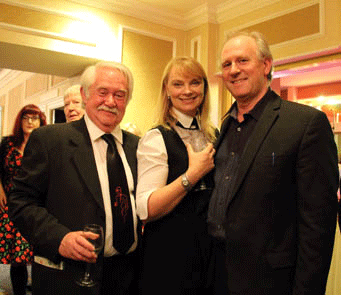
Peter Davison had been at CrimeFest to help present the prize to the winner of this year’s Margery Allingham Short Story competition, who turned out to be the writer, journalist, interviewer and now quiz show hostess, the talented Mr Peter Guttridge.
|
|
Around the World in 80 Murders
Okay, so it’s not exactly completely around the world and there may not be quite eighty suspicious deaths involved, but you get the idea.

Billed as the first thriller by Jack Grimwood (aka the science fiction writer Jon Courtenay Grimwood), Moskva, out now from Penguin/Michael Joseph, comes with the tag “Fatherland meets Gorky Park”. Well, I get the Gorky Park reference, but I’m not too sure about the comparison with Robert Harris’ Fatherland. If anything, Grimwood’s dark depiction of Moscow in 1985 reminded me of Donald James’s futuristic (oddly enough) version of Russia in his 1997 ‘Vadim’ thriller Monstrum. But be all that as it may, Moskva has quite enough going for it to make comparisons futile. It is a bleak and bloody thriller with a serpentine plot which I think I almost followed and a sympathetic British hero (ex-army, on secondment to the Embassy in Moscow to keep him out of the way) who somehow survives being shot with a crossbow, but more impressively the numerous heavy vodka drinking sessions he gets involved in.
The faint of heart should be warned that there is a particularly harrowing autopsy scene and the villains have some curiously cruel ways of torturing their victims.
From the harsh and brutal Moscow in 1985, we move seamlessly (sort of) to the delightfully tranquil, though far from sleepy, present-day Dordogne for another ‘Bruno Chief of Police’ adventure from Martin Walker.

Bruno Courréges, if you haven’t come across him yet, is the chief of police of the idyllic French country town of St Denis – which I have spent many happy hours trying to pinpoint on a map – somewhere between Sarlat and Perigueux. In Fatal Pursuit (from Quercus) Bruno is involved in the hunt for a missing classic car, the voluptuous Bugatti 57c Atlantic – only four were built in the 1930s and one went missing, somewhere in France, during World War II.
Author Martin Walker will be in London on 7th June where he will be interviewed by “the fantastic Barry Forshaw” (it says on the invite) at Waterstones in Piccadilly. It is just possible that Martin Walker will reveal the exact location of his fictional St Denis and perhaps even bring along a supply of the excellent local wine.
Still in France, but this time with a distinct Nordic twist, the new novel from multiple-award-winner Fred Vargas is A Climate of Fear, published by Harvill Secker in July.

A body in a bath tub is not the only suggestion of a link to the days of the French Revolution, but it is the strange Runic symbol left at the scene of the crime which provides a mysterious connection to Iceland and an Icelandic demon, causing Commissaire Adamsberg more than his usual number of headaches.
Still in France, but back in 1941, Alan Furst’s A Hero In France, out now from Weidenfeld & Nicolson, is a quite sublime evocation of a Paris recently occupied by the Germans and how a few good men decide to ‘do their bit’ in the early days of the French Resistance by helping shot-down British aircrew escape capture.

There are no overblown gunfights or set-piece battles, but Furst wrings every drop of tension out of the minutiae of day-to-day espionage conducted by noble amateurs with the best intentions, seemingly against unsurmountable odds. As always, Furst’s unheroic heroes are fully-fleshed characters and his writing at times is positively lyrical.
Swapping countries – and eras – it is always a pleasure to welcome a new novel by John Lawton, whose latest The Unfortunate Englishman is out now from Grove Atlantic.

The regular reader of this column (yes, there is one) will know that I am a long-time fan of Lawton’s skill in portraying the dusty underworld of the Europe of the 1940s and 1950s. In The Unfortunate Englishman, Lawton moves us into the 1960s and on to Berlin and Moscow, so spies (real and fictional), spy swaps and bridges are to be expected. This is the second outing for his latest central character, Joe Wilderness, who appeared in Then We Take Berlin, and the book proves, if proof were needed, that in his chosen field of operation, Lawton can be ranked up there with Philip Kerr, Alan Furst, Joseph Kanon and David Downing.
Japan has long been a loyal an enthusiastic market for British crime-writers and is also a country which has knowledgeable critics and publishers of crime fiction. Now, finally, I believe Japanese crime-writing is getting a fair shot in translation over here.

The latest arrival here, from Titan Books is The Silent Dead by Tetsuya Honda, which introduces a female Japanese homicide detective, Reiko Himewaka, in a police procedural reminiscent of Prime Suspect, which is no bad thing. But if you think Jane Tennison had to put up with outdated, sexist colleagues and working practices, you should see what Reiko has to deal with! It promises to be the start of an interesting series (the books are already successful in Japan) and my only qualm is that the English title has already been used for another crime novel this year and the original Japanese title, Strawberry Night, seemed perfectly good to me.

I did a double-take when I first saw Nevada Barr’s new novel Boar Island, out now from Headline, mistaking it for an old Alistair MacLean title (Bear Island) but of course it is nothing of the sort. This is the latest adventure for National Park Service Ranger Anna Pigeon who finds herself seconded to the Arcadia National Park in Maine.
The coastline of Maine is both rugged and jaw-droppingly beautiful and the perfect location for a mystery story – or a scary story, and one day I must relate my experience of many years ago when I found myself on that very Maine coast one dark night lodging with Stephen King’s next-door-neighbour. The world, however, is not yet ready for that tale…
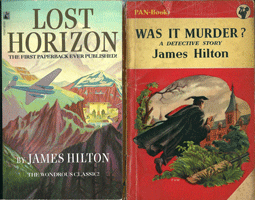
My failing eyesight was called into question again when I received a copy of a new James Hilton novel and instantly began reminiscing about how much I had enjoyed his classic 1933 adventure novel Lost Horizon and his earlier detective story Was It Murder? originally published as Murder At School.

Once I had located my opera glasses and brought things into focus, of course, my ridiculous mistake soon became clear. Search and Destroy, from Titan Books this month, is the debut novel by the James Hilton who is very much alive (the Lost Horizon man died in 1954), lives in Carlisle and is the brother of thriller writer Matt.
This James Hilton’s novel introduces a pair of heroes, the brothers Danny and Clay Gunn, and is set not in Shangri-La, nor even Carlisle, but in the Nevada desert in America.
O Sole Mio
I have to admit that I was disappointed at the attendance at this year’s Chianti Crime Festival, particularly for my opening address.Perhaps it was a mistake to give my lecture in Latin, as I discovered too late that few Italians now speak it.
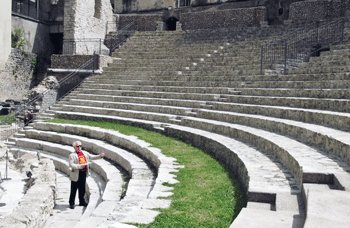
It could, of course, have been the fact there was a real crime-writing festival taking place in Italy at exactly the same time, the Dia Negro conference hosted by the Catholic University of Milan which featured the husband-and-wife team ‘Michael Gregorio’ (Michael Jacob and Daniela de Gregorio) and was chaired by Luca Crovi, who has the distinction of being known as ‘the Italian Barry Forshaw’.
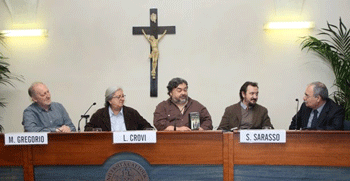
Diary Dates
I hope to have more details of September’s Bloody Scotland for next month’s column, along with news of this year’s Crime in the Court event in London’s stylish West End – should there be one and if anyone bothers to tell me about it.
Meanwhile, I already have two dates for your diaries for October. The first is Saturday 15th October, which will see the first Killer Women Crime Writing Festival take place in Shoreditch Town Hall in London (the venue for the autopsy on one of Jack the Ripper’s victims back in 1888). Tickets for the day-long convention, which will feature Martina Cole and Val McDermid among others, are on sale now, I believe, and further details should be found on www.killerwomen.org.
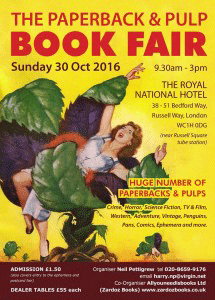
I missed the last Paperback and Pulp Book Fair for reasons neither good nor memorable, but I intend to go to this year’s event, in the Royal National Hotel on Sunday 30th October, if only to buy back all those wonderful Pan paperbacks I foolishly disposed of when I embarked on married life some forty years ago. (Forty years – the bloody Train Robbers didn’t get that!).
And Finally…
Selected examples from the “Twisted Titles” round of Crimefest’s I’m Sorry I Haven’t A Cluedo provided by panellists and audience:
Tinker, Tailor, Soldier, Family Liaison Officer
Brighton Frock
Gaudy Tights
Lord Edgeware Diets
The Malteaser Falcon
The Daughter of Tim
I Was Luis Suarez
And Then There Were Nuns
There were many others…
Toodles!
The Ripster.
Picture credits (but I keep the negatives):
Ali ‘Snapper’ Karim, Lesley Simpson, Kiwi Craig Sisterson, Douglas Lindsay
|